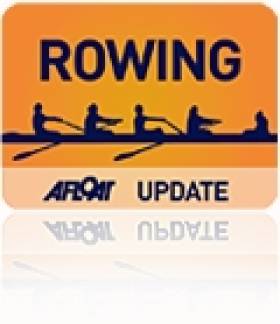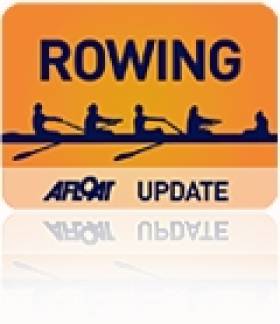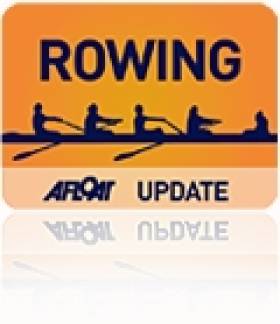Displaying items by tag: Grigalius
Grigalius Among Ireland Winners at Home International Rowing
#ROWING: Ireland had some notable wins in the first session of the Home International Regatta at the National Rowing Centre in Cork today. Eimantas Grigalius won the men’s single sculls impressively, while Niall Duncan matched him in the lightweight single. The Carlow men’s pair of Niall Murphy and Alan McKenna also won, though Murphy returned to the sport after a long break. Relatively new entrants to the sport Emma Desmond in the lightweight single sculls and pararower Katie O’Brien also won.
The women’s junior double sculls and lightweight double sculls also brought Ireland top points, as did the men’s four of Thomas Deere, Ryan Corcoran, Daniel Buckley and Kevin Coughlan.
Home International Regatta, National Rowing Centre, Cork
Men
Four: 1 Ireland (T Deere, R Corcoran, D Buckley, K Coughlan) 6:11.85, 2 England 6:12.21. Junior: 1 Wales 6:24.97; 3 Ireland 6:33.09.
Four, coxed: 1 Scotland 6:31.05; 3 Ireland 6:48.43. Junior: 1 England 6:38.35, 2 Ireland 6:40.57.
Pair: 1 Ireland (N Murphy, A McKenna) 6:59.04, 2 Scotland 7:02.13, 3 England 7:25.08. Lightweight: 1 Scotland 7:07.86; 3 Ireland 7:17.19. Junior: 1 England 7:00.84, 2 Ireland 7:02.98.
Sculling, Quadruple – Junior: 1 England 6:10.89; 3 Ireland 6:27.26.
Double: 1 Scotland 6:40.76; 3 Ireland 6:51.88. Lightweight: 1 England 6:45.82; 3 Ireland 6:59.23. Junior: 1 Ireland (S Mulvaney, F McCarthy) 6:44.18, 2 England 6:45.59.
Single: 1 Ireland (E Grigalius) 7:12.90, 2 Scotland 7:21.52, 3 England 7:26.99. Lightweight: 1 Ireland (N Duncan) 7:22.39, 2 Scotland 7:26.29, 3 Wales 7:35.88. Junior: 1 Scotland 7:14.12; 4 Ireland 7:48.73.
Women
Four: 1 Scotland 6:50.28; 4 Ireland 7:21.12. Junior: 1 England 7:09.13; 3 Ireland 7:17.43.
Four, coxed: 1 Scotland; 3 Ireland 7:28.59. Junior: 1 Scotland 7:31.43; 4 Ireland 7:41.00.
Pair: 1 Scotland 7:36.50; 3 Ireland 7:49.83. Lightweight: 1 Scotland 7:50.28, 2 Ireland 8:01.28. Junior: 1 Scotland 7:47.97; 4 Ireland 8:01.67.
Sculling, Quadruple – Junior: 1 England 6:57.40; 3 Ireland 7:09.94.
Double: 1 Scotland 7:28.98; 3 Ireland 7:39.57.
Lightweight: 1 Scotland 7:22.07; 3 Ireland 7:48.63. Junior: 1 Scotland 7:33.87; 3 Ireland 7:45.72.
Single: 1 Wales 7:57.28; 4 Ireland 8:19.93.
Lightweight Single: 1 Ireland (E Desmond) 8:03.69, 2 England 7:4.02, 3 Wales 7:35.88. Junior: 1 England 8:14.03; 4 Ireland 8:30.05.
Pararowing: Trunk and Arms single sculls: 1 Ireland (K O’Brien) 4:51.98.
#ROWING: The Irish challenge in the Double Sculls at Henley Royal Regatta was ended this morning as the British national crew of John Collins and Jonathan Walton beat Dave Neale and Eimantas Grigalius of Three Castles. The British, who have been finalists at the European Championships and the World Cup in Aiguebelette, were half a length up by the top of the Island and three lengths up at 500 metres. The winner was never in doubt from that point.
Henley Royal Regatta, Day Three (Selected Results; Irish interest)
Double Sculls Challenge Cup (Men, Open): Leander (J Collins, J Walton) bt Three Castles (D Neale, E Grigalius) 2l, 7 mins 48 secs.
Neale and Grigalius on Song at Henley
#ROWING: Dave Neale and Eimantas Grigalius made an excellent start at Henley Royal Regatta today. The Three Castles’ men took the lead early in their heat of the Double Sculls and never relinquished it against the lighter crew of Chris Owen and John Hale from Roy Roy Boat Club. Neale and Grigalius had a three-length lead by halfway and won by that margin.
Queen’s exited the Prince of Wales in the first round. The Irish quadruple fell to Tyrian and Thames in a race which was decided early on. Queen’s were behind by a length by 500 metres, and while they made a number of pushes they did not make enough progress into the headwind conditions.
Henley Royal Regatta, Day Two (Selected Results; Irish interest)
Prince of Wales Challenge Cup (Men’s Quadruple Sculls, Intermediate): Tyrian Club and Thames RC bt Queen’s University (G McKillen, A Boreham, T Oliver, C Beck) 3l, 7:17.
Double Sculls Challenge Cup (Men, Open): Three Castles (D Neale, E Grigalius bt Roy Roy (C Owen, J Hale) 3l, 8:08.


























































